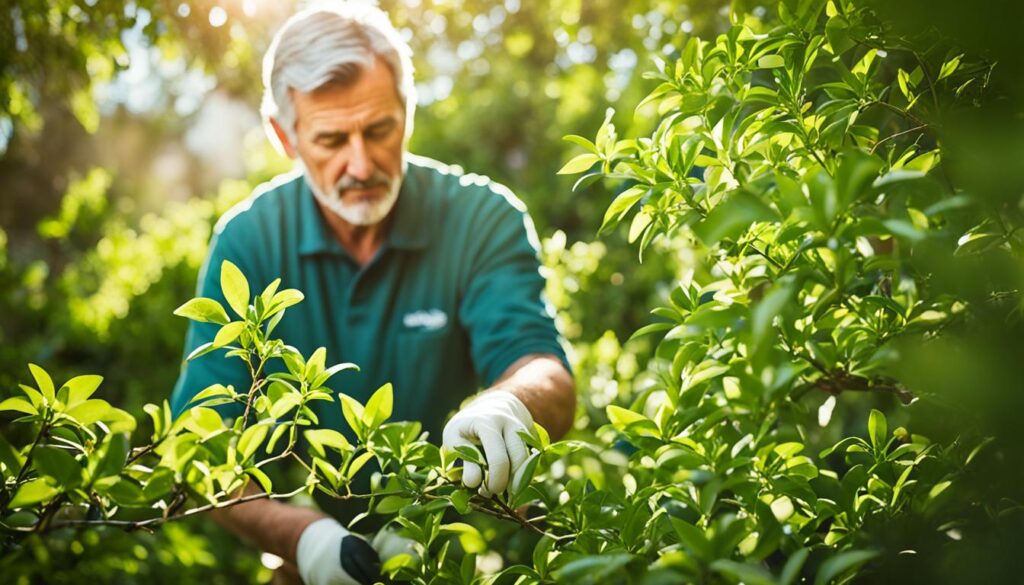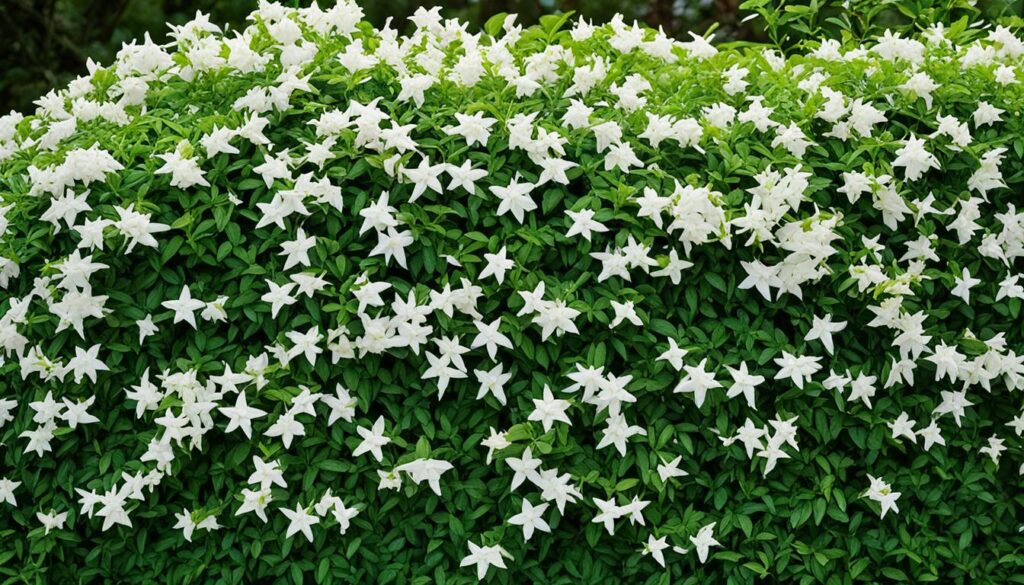Do you love the sweet smell of jasmine flowers? Imagine your garden with the lovely scent of the jasmine plant. It comes in over 200 types, filling the air with its jasmine fragrance. The Jasminum officinale and Jasminum sambac lead a world of jasmine that will win your heart.
Aromatic flowers and many uses make jasmine famous. For years, it’s been key in medicine and cultural customs. Its scent, look, and uses make it a top choice. This guide dives into its history, types, and how to grow it. Get ready to add this enchanting jasmine to your garden.
Ready to learn about the jasmine tree? Ready to make your garden smell like heaven? Let’s see how this plant can make your garden even better.
Unveiling the Captivating World of Jasmine
Jasmine has fascinated people worldwide for ages. Its botanical roots and rich cultural history keep its charm alive. This plant, part of the Oleaceae family, includes over 200 species. Each type, under genus Jasminum, has shaped human history deeply.
Botanical Origins and Classification
Botanically, jasmine is part of the Oleaceae family, known for its fragrant flowers. Different jasmine types vary in appearance, behavior, and where they naturally grow. The unique qualities of each type add to the beauty of jasmine.
Historical and Cultural Significance
Across the globe, jasmine is deeply meaningful in various cultures. It’s a symbol of purity, love, and moral goodness. In Asia, jasmine plays a key role in religious and marriage rites.
This use shows its spiritual and emotional importance beyond beauty. Such traditions reveal jasmine’s deep and lasting impact on human history and beliefs.
jasmine Tree: A Symphony of Fragrance and Beauty
Jasmine comes in many types, each with its own charm and scent. Jasminum officinale, or Common Jasmine, is loved for its white flowers that smell amazing. Jasminum sambac, known as Arabian Jasmine, has small flowers that are very fragrant. It’s often used in ceremonies and to make perfume.
Alluring Varieties of Jasmine
Jasminum polyanthum, or Pink Jasmine, stands out with its pink buds and white flowers. It’s a great choice for adding beauty to garden walls. Jasminum mesnyi, the Japanese Jasmine, features bright yellow flowers and glossy leaves, making any garden lively. These types of jasmine are loved by those who love to garden.
Jasminum officinale: The Classic Jasmine
Jasminum officinale, or classic jasmine, is well-known for its beautiful, fragrant flowers. It’s a top pick for making teas, perfumes, and decor. This jasmine shows the plant’s wide uses and lasting popularity.
Jasminum sambac: The Aromatic Arabian Jasmine
Jasminum sambac, the Arabian Jasmine, has tiny, waxy flowers that smell great. It’s important in ceremonies and the perfume industry, showing its special place in culture and beauty.

Cultivating Jasmine: Essential Tips and Techniques
Cultivating jasmine well needs an understanding of its needs and care. By understanding what makes this plant thrive, your garden will be a joy. It will be filled with a great smell and impressive flowers.
Ideal Growing Conditions
Jasmine plants do best in places with lots of sun or some shade. They like soil that drains well and is rich. It should be a bit acidic to neutral. These conditions help the plant have beautiful leaves and lots of flowers. Remember, plants need enough space between them for air to flow. This helps them stay healthy.
Planting and Maintenance
Plant jasmine in the spring or early fall. This gives the plants time to grow strong roots before it gets too hot or too cold. When planting, think about how big the plant will get. It needs room to grow big and air to flow. Water them regularly, add fertilizer when needed, and cut them back after they bloom. This care will help your jasmine plants do well.

Follow these techniques to grow a wonderful jasmine garden. It will be not just beautiful but also smell amazing. Your garden will truly be a magical place.
Jasmine’s Versatile Applications
Jasmine isn’t just eye candy; it’s a plant with many uses. Its oil is great for relaxing in aromatherapy. It helps you feel calm and happy. You can also enjoy jasmine in tea. This tea is known for being light and calming, making it a joy to drink.
Aromatherapy and Wellness
Jasmine is sought after for its calming scent in aromatherapy. The oil from its flowers can help lower stress and anxiety. It makes you feel better overall. Adding jasmine oil to your daily routine can do wonders for your well-being.
Culinary Delight: Jasmine Tea
Jasmine is not just for smelling good. It’s popular in foods, like jasmine tea. This tea tastes great and calms you down. It’s a treat, whether you like it hot or cold.
Landscaping with Jasmine
Jasmine is also a star in the yard. Its sweet scent and lush look make any space better. Use it to cover the ground, make hedges, or climb up things. The smell of jasmine turns a yard into a peaceful paradise. It’s perfect for any garden project.

Common Challenges and Solutions
To keep your jasmine plants healthy, watch out for jasmine pests and jasmine diseases. You might face aphids, scale insects, and spider mites. These can harm your jasmine. Be ready and take action early to protect your plants.
Jasmine can also get fungal diseases, like powdery mildew. This is more common in damp places. Learn to spot these issues and use the right methods to solve them. This keeps your jasmine strong.
Knowing about common jasmine problems is the first step to solving them. With the right care, you can keep your jasmine beautiful and fragrant for a long time.
Embracing the Enchantment of Jasmine
Adding jasmine to your garden brings not just beauty but also a wonderful scent. Its flowers are elegant, and the smell is calming. With jasmine, you can turn your garden into a peaceful place.
Create a Fragrant Oasis
Place jasmine plants strategically for an amazing scent all around your garden. Jasmine’s unique scent will stay with you, relax your mind, and bring happiness.
Enhancing Personal Well-being
Jasmine is not just pretty; it also helps you feel better. Its scent can reduce stress and help you relax. Adding jasmine to your life and garden can be good for your happiness.
Jasmine’s Enduring Legacy
Jasmine has a deep and lasting impact on our history. It’s not just a flower, it’s a symbol of beauty, love, and purity. Many cultures use jasmine in special events like weddings, seeing it as more than just a pretty flower.
In Asia, jasmine is part of religious and wedding ceremonies. It’s not just for looks. Jasmine is full of spiritual and emotional meaning.
This highlights how jasmine is timeless. It connects us to traditions and beliefs passed down over the years. Jasmine is not just a plant; it’s a symbol we treasure for its beauty and meaning, lasting through the ages.
Cultural and Symbolic Importance
Jasmine’s legacy is deeply tied to cultures worldwide. It symbolizes important virtues like purity and moral beauty. In special events like weddings, jasmine becomes a sacred part that’s more than just a flower.
Jasmine’s importance across cultures shows how it bridges our past with the present. Its cultural and symbolic value continue to be admired and cherished. This makes jasmine a timeless symbol that we continue to hold dear.
Extending the Jasmine Experience
Jasmine offers more than just being a pretty flower. It provides opportunities to dive deeper into its beauty. By using jasmine essential oil, made from its flowers, you can find calm and relaxation. Try different ways to use jasmine to feel closer to this amazing plant.
Jasmine Essential Oils
Jasmine flowers’ scents are turned into a special essential oil. This oil is loved for its soothing effects and feels uplifting. You can use jasmine oils in your daily life through scents, massage oils, or in your bath. This way, you can enjoy their calming effects.
Floral Arrangements and Crafts
The mild jasmine flower is perfect for making flower arrangements and crafts. Add jasmine to your flower bunches, wreaths, or decorations to enjoy its scent at home. You can also use jasmine in crafts like making candles or potpourri. These crafts help bring jasmine’s beauty into your home.
Using jasmine in different ways helps you really see how special this plant is. You can enjoy its benefits through oils or even by adding jasmine items to your home. This shows that jasmine’s magic isn’t just in the garden.
Jasmine: A Timeless Addition to Your Garden
Jasmine has been around for centuries, charming people with its smell and beauty. It’s a favorite for those who love gardening and nature. You can choose from classic types like Jasminum officinale or the colorful Jasminum mesnyi. No matter your choice, jasmine will fill your garden with a sweet scent.
Adding jasmine to your garden brings in a special kind of magic. It turns your garden into a place of peace and beauty, leaving a wonderful memory for you and your visitors. Its charming look and lovely smell create a soothing atmosphere that’s hard to resist.
Introducing jasmine to your garden opens up a world of beauty. Each type has its own unique features. Exploring the many faces of this plant will add something truly special to your garden. It’s a great way to enjoy both the look and smell of your outdoor area.



